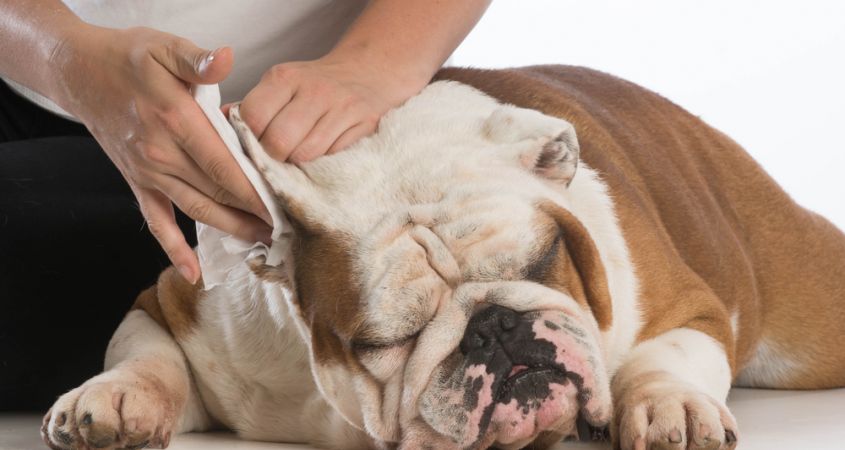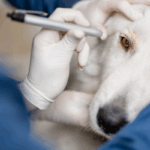Treating ongoing skin and ear conditions in pets can absolutely be very frustrating for owners at times. It is one of the biggest frustrations that we hear about from owners as Veterinarians and Veterinary Nurses.
Getting on top of a Skin or Ear infection (or another diagnosed skin condition) can sometimes be tricky and we understand this. It can involve the Pet Owner needing to potentially administer several different types of medication at once, or it could involve recommended dietary changes to rule out dietary sensitivities or food allergies. All of which involves a strong commitment and involvement from the pet owner. Trying to find the cause of a Pets potential allergy or infection, can at times involve multiple Veterinary visits and revisits, Cytology and in-house clinic testing or work up if required. Treating some Ear and Skin conditions can at times be a little bit of trial and error, as what may work the first time for one Pet may not work for another. We will always offer the very best medicine and the latest treatments at the Hospital for both Skin and Ear conditions, and we will work together with you and your beloved Pet, until we can get on top of the problem and manage it appropriately.
Our best tips for helping you to stay on top of a diagnosed skin condition or diagnosed ear infections;
1. Medications; Please ensure that all medications are given exactly as directed by the Veterinarian. Sometimes it can be hard to remember to give your Pet antibiotics twice daily, or ear mediations twice or three times a day, especially if it is a struggle to get these medications into your pet in the first place. We understand that it sounds quite obvious, but a break in medicating your pet or a lapse in giving the required treatment could delay the healing/treatment process quite significantly. If you are having trouble medicating your Pet, please do not hesitate to let us know and we will help out wherever we can or suggest any potential alternatives that may be suitable for your Pets condition.
2. Ongoing Treatment; If you are unsure as to why your Veterinarian might be recommending a new or different treatment to trial for your pet, please do not hesitate to ask about this. We will always do our very best in endeavoring to clearly explain all test results and treatments to you, however if you are still not sure about something please ask us. Even if it means a phone call to the Hospital an hour after your appointment with us, we don’t mind one bit! We want you to feel comfortable and happy with how we are managing your Pets condition and to be involved in every step of treatment along the way.
3. Dietary Trials; If your Pet is on a Specialised Allergy diet or an elimination trial, please ensure that all instructions regarding the diet are followed strictly. It can be very tempting to just give that one little piece of toast or cheese as a little reward, but unfortunately that one tiny treat might mean an inaccurate result for the entire dietary trial. If we have advised solely feeding a particular diet, then please ensure that your Pet is fed this and only this for the trial period. We will advise you as soon as you are able to add other foods back into the diet if and when it is ok to do so.
4. Managing an Ear or Skin condition versus curing it; Some pets are unfortunately much more prone to developing either recurrent skin issues, ear issues or both. For some pets it is a breed predisposition that makes them much more susceptible than other pets to these conditions, and for some pets there is no genetic reasoning whatsoever behind why they develop these conditions. Especially when compared with other pets who may go their entire lives without suffering from these conditions. For patients who are susceptible to developing these conditions more than others, sometimes this means that our treatment plan may be slightly different in regards to how we manage their symptoms and their flare ups. Pets who are frequently being seen and treated for these concerns may have their conditions managed to keep their symptoms at bay rather than being cured. Each pet is treated as an individual though and will have their treatment plan tailored around what works best for them.
5. Revisit appointments for your pets condition; We understand that it can be frustrating if and when your pet requires ongoing visits for the same condition. It in incredibly important for your pets condition and their progress, that pets are rechecked when recommended by the veterinarian. It may seem like your pet is cured after the first appointment and with the medications that may have been prescribed at the time. It may therefore seem like there is no point in returning to the Vet if they are “all better”. However sometimes bacteria and other infections require multiple treatments or prolonged medication courses. It is important for us to assess the pets condition thoroughly and to perform repeat cytology where needed to see if the infection (ears or skin) are being controlled and managed appropriately. Our eyes are not microscopes, so sometimes the only way for us to determine if the condition is actually improving is through performing repeat cytology for us to best assess this.
6. Pet Insurance; We highly recommend that all Pets are covered by Insurance to help cover the costs of Veterinary Care and treatment, if and when your pet requires this. Pets who are prone to ear and skin conditions can benefit all the more from having Insurance on board to alleviate the financial pressure that these ongoing conditions can sometimes cause. Please ensure that you shop around for what Insurance might be the most appropriate for your pet and be sure to check up on any pre-existing conditions or conditions that may not be covered by their policies.






